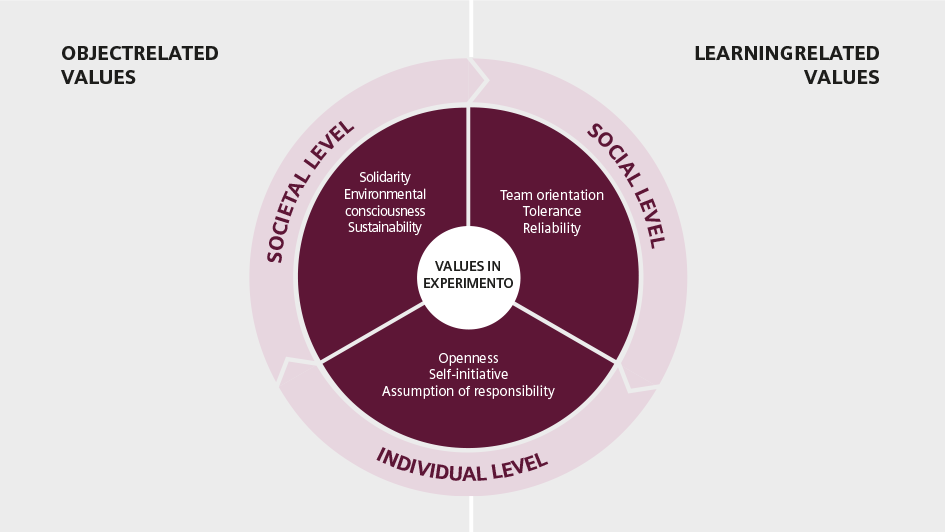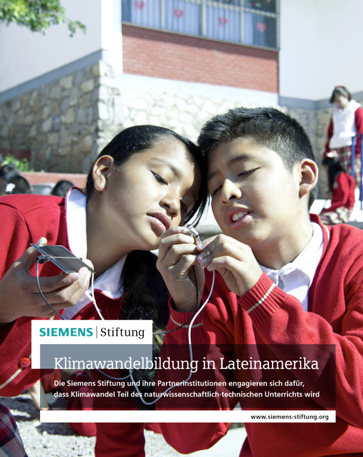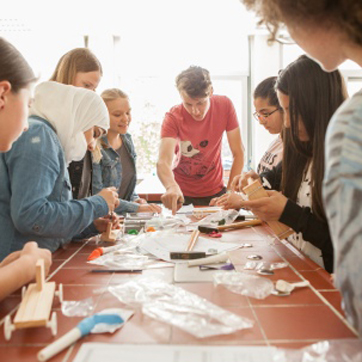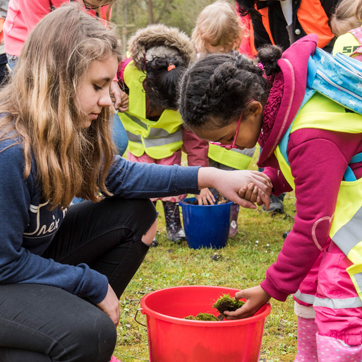STEM and values Responsible teaching and leaning

We have arrived in the age of digitalization: ever-evolving technologies are permanently changing our society and the way we live. Are we ready for this? To conscientiously shape our future, we’ll need more than basic literacy in science and technology: the ability to carefully reflect on context and consequences is also of increasing importance. Therefore, it is our goal to make sure our work in education supports values and behaviors that guide our actions on an individual, interpersonal, and societal level. As part of discussion forums and with concrete pedagogical approaches, we support STEM education with value formation at its core.
Definition
Does value formation belong in STEM subjects?
Shouldn’t science always be objective and free of judgment? Yes, it should! But only with the ability to evaluate findings does science enrich our lives. The OECD defines scientific literacy as the ability to engage with science-related issues, but also includes the importance of being able to apply scientific knowledge in the context of real-life situations (OECD 2017). It is about more than pure knowledge: it is also about assessing knowledge and eventually putting it to use as individuals and as a society (cf. Mandl, Kopp, Niedermeier, Meixner 2015).
Experiencing values in the classroom
We understand values to be “the foundation of every social society” (Menzel, 2013): conscious or unconscious standards of orientation and principles that guide an individual or a group. In science and technology lessons, we differentiate between object-related values and learning-process-related values.
»Technological advancement must be seen as a social action.«

- Object-related values are specifically tied to the subject matter: Can renewable energies completely replace coal, gas, and atomic energy? Or, what are the opportunities and risks associated with genetic technology in agriculture? This is not about students memorizing the familiar assessments of what they learn. It is more important that students develop a factual consciousness and their own take on information that helps them make informed decisions in their lives.
- Learning-process-related values are a result of working together in a classroom setting: a set of basic values for living harmoniously with each other such as tolerance, team orientation, or reliability. They encourage personal development and are the foundation of a peaceful coexistence.

Comenius-Medaille für unsere Klimawandel-Medien
- Teil I: Die globale Erwärmung verstehen
- Teil II: Auswirkungen des Klimawandels
- Teil III: Das 1,5-Grad-Ziel
- Teil IV: Klimagerechtigkeit
Motivation
Why we consider value formation in STEM subjects to be essential
When it comes to science and technology, evaluation and reflection on the subject matter is often neglected in schools. Value formation tends to be confined to religion or ethics classrooms, even though plenty of interesting and important ethical questions arise in subjects such as biology, physics, computer science, or chemistry. With our work in the field of education, we aim to establish lessons that encourage contemplation, critical reflection, and practical application of science and technology in the context of a society. We strongly believe that more than ever, young people today need a triad of knowledge, skills, and the right attitude.
Knowldge, skills, and the right attitude
- Knowledge refers to specialized information, interdisciplinary correlations, and method knowledge. Smart decisions can only be made based on solid knowledge of science and technology with an understanding of the related correlations.
- But knowledge alone is not enough. We also need the ability to utilize knowledge with cognitive, social, emotional, and practical skills. Without these, we won’t be able to come up with new ideas or solve new problems.
- Here again, these skills on their own still fall short if values and the right attitude are missing. These shape our actions on an individual, interpersonal, and societal level. A stable set of values helps evaluate potential courses of action and to arrive at reasoned, conscientious decisions.
Value formation is an important part of character development. We consider it quite important to impart a sense of the ethical dimension of our actions at an early age, in addition to making correlations and consequences transparent.
A STEM education triad of knowledge, skills, and the right attitude means much more than solving pressing problems in the workforce, such as a skills shortage or the lack of specialized workers. It’s about something bigger: educational justice and participation or improving quality of life – particularly in developing and emerging countries.

»Values are indispensable for the future of society.«
Dr. Heinz Mandl, Professor Emeritus at Ludwig-Maximilians-Universität München (LMU), explains how the education program Experimento incorporates value formation into STEM lessons.
Focus
Ecnouraging value-oriented STEM lessons
Our goal is to reach teachers, students, and education policymakers alike with value-formation projects. We work with our partners to create concepts and approaches that introduce progressive questioning to classroom lessons while also setting up forums to encourage debate on the subject.
Experiments with values
The focus of our education program Experimento is on acquiring knowledge in science and technology subjects. Taking it a step further, we worked with Ludwig-Maximilians-Universität München (LMU) to explicitly focus on value formation with a multi-tiered, age-appropriate concept for developing values in STEM lessons. Even the smallest children take a playful approach to scientific phenomena while perceiving environmental and sustainability issues. The questions become more complex as they get older. Students discuss questions pertaining to values in the form of dilemmas, where there are no right or wrong answers. The focus is on a student’s own reflection, consideration, and decision.
Teaching materials for inclusive STEM lessons
For us, incorporating values into experimentation lessons also involves taking a differentiated and individual approach to promoting each student’s abilities while recognizing the increasing diversity of young learners. For our experiments, we also developed several inclusive teaching and learning materials. While the subject matter is the same for everyone in a class, the material is introduced in a way that is easy to initially grasp, with incremental hints and additional assignments of varying difficulty providing further steps that accommodate each student’s working and learning pace.

Service-Learning in STEM subjects
By linking scholastic learning in the classroom with civic engagement – Service-Learning – students can apply what they learn in science class and make a valuable contribution to their communities. In addition to reinforcing the lessons, this approach teaches teamwork and the importance of civic engagement while providing a chance to experience what values are. A comprehensive handout and interactive web-based training provide teachers with a methodic approach to the fundamentals, several suggestions, and first steps for implementation.
“STEM and Values” in Wertebündnis Bayern, a regional alliance for promoting values
The concepts and methods we developed for value formation in STEM lessons are now part of the “STEM and Values” project at Wertebündnis Bayern, a regional alliance in the German state of Bavaria that focuses on teaching values to young people. The project aims to incorporate value formation into STEM lessons at primary and secondary schools in Bavaria, while providing teachers with additional training to teach this material.
Dialog platform: STEM and Values Symposium
Beyond concepts and practical applications, we consider it essential that political discourse addresses the concept of value formation in STEM lessons. This is how value formation becomes permanently anchored in science and technology education, and how the pedagogic practice spreads. This is also why we are engaged in a lively discussion with academic and political representatives on how value formation can be achieved in the classroom. The results from the symposium in March 2017 are available on the event website.
Internationale Perspektiven auf Klimaschutz
In unserem Podcast „Courage & Innovation“ sprechen Dr. Claudia Uribe (UNESCO) und Dr. Nina Smidt (Siemens Stiftung) darüber, wie internationale Zusammenarbeit Bildung zum Klimawandel verbessern kann.

Voneinander lernen

Klimawandelbildung in Lateinamerika
In der Broschüre „Klimawandelbildung in Lateinamerika“ haben wir Best-Practice-Ansätze sowie Positionen zur Klimawandelbildung zusammengetragen. Sie soll Bildungsakteure weltweit ermutigen, Bildung zum Klimawandel auf die eigene Bildungsagenda zu setzen.
This might also interest you:
Would you like to learn more?
Website
Background material
- N. v. Siemens: Wertebildung und die MINT-Fächer. Speech at the TUM-event "MehrWert MINT" (2018, German)
- N. v. Siemens: Speech at the “Symposium STEM and Values” (2017, German)
- B. Filtzinger: MINT und Werte: Fachwissen stärken und Orientierung geben. Article by Dr. Barbara Filtzinger (2017, German)
- Die Zeit: „Mehr Diskussion!“. Interview with Nathalie von Siemens (2017, German)
- Eberhard Karls Universität Tübingen. Studie: „Wertorientierungen und Werterziehung von Lehrerinnen und Lehrern in Deutschland“ (2018)
References
- H. Mandl, B. Kopp, S. Niedermeier, M. Meixner: Leitfaden „Naturwissenschaften, Technik und Werte“. Methoden zur Implementierung des Werteaspekts in den naturwissenschaftlich-technischen Unterricht mit Experimento | 8+. München (2015)
- OECD (Hg.): How does PISA for Development measure scientific literacy? (2017)
- G. Ropohl: Ethik und Technikbewertung. Frankfurt am Main (1996)
- S. Menzel: Werte-Bildung im naturwissenschaftlichen Unterricht: Kein Widerspruch. In: M. Naurath, M. Blasberg-Kuhnke, E. Gläser, R. Mokrosch, S. Müller-Using (Hg.): Wie sich Werte bilden. (2013)






